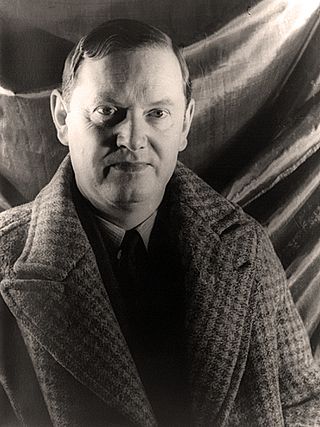
Arthur Evelyn St. John Waugh was an English writer of novels, biographies, and travel books; he was also a prolific journalist and book reviewer. His most famous works include the early satires Decline and Fall (1928) and A Handful of Dust (1934), the novel Brideshead Revisited (1945), and the Second World War trilogy Sword of Honour (1952–1961). He is recognised as one of the great prose stylists of the English language in the 20th century.

Sir Edmund William Gosse was an English poet, author and critic. He was strictly brought up in a small Protestant sect, the Plymouth Brethren, but broke away sharply from that faith. His account of his childhood in the book Father and Son has been described as the first psychological biography.

Ronald Arbuthnott Knox was an English Catholic priest, theologian, author, and radio broadcaster. Educated at Eton and Balliol College, Oxford, where he earned a high reputation as a classicist, Knox was ordained as a priest of the Church of England in 1912. He was a fellow and chaplain of Trinity College, Oxford until he resigned from those positions following his conversion to Catholicism in 1917. Knox became a Catholic priest in 1918, continuing in that capacity his scholarly and literary work.

Brideshead Revisited: The Sacred & Profane Memories of Captain Charles Ryder is a novel by the English writer Evelyn Waugh, first published in 1945. It follows, from the 1920s to the early 1940s, the life and romances of Charles Ryder, especially his friendship with the Flytes, a family of wealthy English Catholics who live in a palatial mansion, Brideshead Castle. Ryder has relationships with two of the Flytes: Lord Sebastian and Lady Julia. The novel explores themes including Catholicism and nostalgia for the age of English aristocracy. A well-received television adaptation of the novel was produced in an 11-part miniseries by Granada Television in 1981. In 2008, it was adapted as a film.
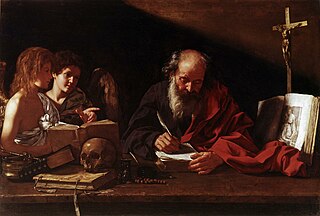
A hermit, also known as an eremite or solitary, is a person who lives in seclusion. Eremitism plays a role in a variety of religions.

In Christianity, an anchorite or anchoret is someone who, for religious reasons, withdraws from secular society to be able to lead an intensely prayer-oriented, ascetic, or Eucharist-focused life. Anchorites are frequently considered to be a type of hermit, but unlike hermits, they were required to take a vow of stability of place, opting for permanent enclosure in cells often attached to churches. Also unlike hermits, anchorites were subject to a religious rite of consecration that closely resembled the funeral rite, following which they would be considered dead to the world and a type of living saint. Anchorites had a certain autonomy, as they did not answer to any ecclesiastical authority apart from bishops.

Sir Harold Mario Mitchell Acton was a British writer, scholar, and aesthete who was a prominent member of the Bright Young Things. He wrote fiction, biography, history and autobiography. During his stay in China, he studied the Chinese language, traditional drama, and poetry, some of which he translated.

Decline and Fall is a novel by the English author Evelyn Waugh, first published in 1928. It was Waugh's first published novel; an earlier attempt, titled The Temple at Thatch, was destroyed by Waugh while still in manuscript form. Decline and Fall is based, in part, on Waugh's schooldays at Lancing College, undergraduate years at Hertford College, Oxford, and his experience as a teacher at Arnold House in north Wales. It is a social satire that employs the author's characteristic black humour in lampooning various features of British society in the 1920s.

A Handful of Dust is a novel by the British writer Evelyn Waugh. First published in 1934, it is often grouped with the author's early, satirical comic novels for which he became famous in the pre–World War II years. Some commentators regard it as a transitional work due to its serious undertones, pointing towards Waugh's Catholic postwar fiction.

William Lygon, 7th Earl Beauchamp,, styled Viscount Elmley until 1891, was a British Liberal politician. He was Governor of New South Wales between 1899 and 1901, a member of the Liberal administrations of Sir Henry Campbell-Bannerman and H. H. Asquith between 1905 and 1915, and leader of the Liberal Party in the House of Lords between 1924 and 1931. When political enemies threatened to make his homosexuality public, he resigned from office to go into exile. Lord Beauchamp is generally considered to be the model for the character Lord Marchmain in Evelyn Waugh's novel Brideshead Revisited.

Brian Christian de Claiborne Howard was an English poet and later a writer for the New Statesman.

Robert Hugh Benson AFSC KC*SG KGCHS was an English Catholic priest and writer. First an Anglican priest, he was received into the Catholic Church in 1903 and ordained therein the next year. He was also a prolific writer of fiction, writing the notable dystopian novel Lord of the World, as well as Come Rack! Come Rope!.
Alfred Duggan was an Argentine-born English historian and archaeologist, and a well-known historical novelist in the 1950s. His novels are known for meticulous historical research.

The Ordeal of Gilbert Pinfold is a novel by the British writer Evelyn Waugh, first published in July 1957. It is Waugh's penultimate full-length work of fiction, which the author called his "mad book"—a largely autobiographical account of a period of hallucinations caused by bromide intoxication that he experienced in the early months of 1954, recounted through his protagonist Gilbert Pinfold.
Christopher Hugh Sykes was an English writer. Born into the northern English landowning Sykes family of Sledmere, he was the second son of the diplomat Sir Mark Sykes (1879–1919), and his wife, Edith. His sister was Angela Sykes, the sculptor. His politician uncle, also Christopher Sykes, was, for a time, a close friend of Edward VII.

The novel of manners is a work of fiction that re-creates a social world, conveying with detailed observation the complex of customs, values, and mores of a stratified society. The behavioural conventions (manners) of the society dominate the plot of the story, and characters are differentiated by the degree to which they meet or fail to meet the uniform standard of ideal social behaviour, as established by society.

The Temple at Thatch was an unpublished novel by the British author Evelyn Waugh, his first adult attempt at full-length fiction. He began writing it in 1924 at the end of his final year as an undergraduate at Hertford College, Oxford, and continued to work on it intermittently in the following 12 months. After his friend Harold Acton commented unfavourably on the draft in June 1925, Waugh burned the manuscript. In a fit of despondency from this and other personal disappointments he began a suicide attempt before experiencing what he termed "a sharp return to good sense".
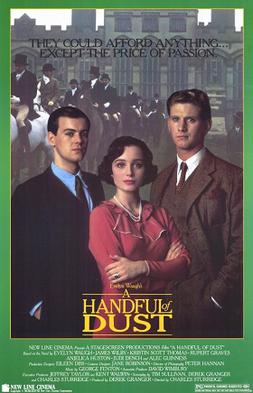
A Handful of Dust is a 1988 British film directed by Charles Sturridge, based on the 1934 novel of the same name by Evelyn Waugh. It stars James Wilby and Kristin Scott Thomas. Originally conceived as a television project, it was the first feature film financed by London Weekend Television.
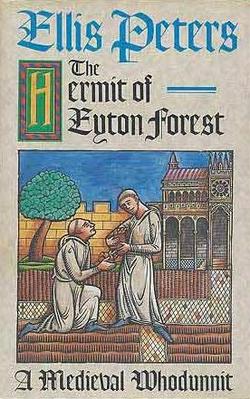
The Hermit of Eyton Forest is a medieval mystery novel by Ellis Peters, set in the autumn of 1142. It is the 14th novel in the Cadfael Chronicles and was first published in 1987.
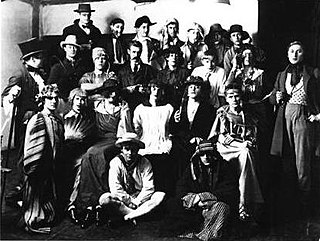
The Hypocrites' Club was one of the student clubs at Oxford University in England. Its motto in Greek, from an Olympian Ode by Pindar, was Water is best. This led to the members being called Hypocrites, due to the fact that beer, wine and spirits were the chosen drinks.

















